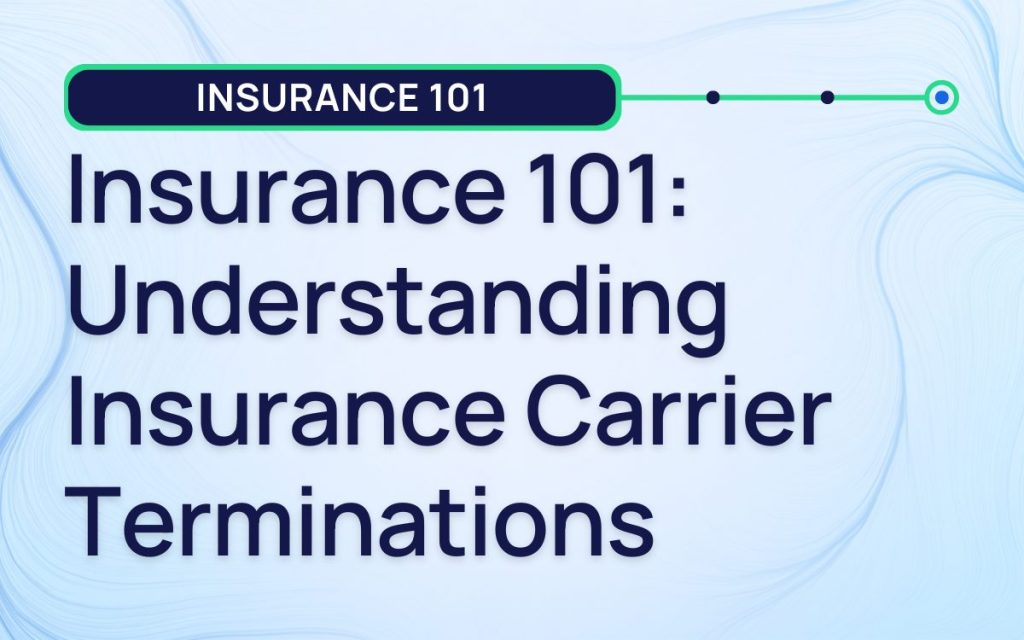Insurance 101: Understanding Insurance Carrier Terminations
In the insurance industry, the term “termination” can refer to a few different things. First, there are policy terminations. These occur when an insurance policy runs its course and the insured or the carrier decides not to renew the contract. There’s also termination insurance – a type of business liability coverage that protects an employer in the event they’re sued by a former employee for wrongful termination.
In this blog, we’re focused on another type of termination: The one that occurs when the business relationship between an insurance producer and a carrier comes to an end.
Insurance producer appointments and terminations
In the past, we’ve talked in detail about carrier appointments, which mark the start of a working relationship between insurance carriers and producers. Now, we’re focusing on the other side of the coin. All good things must come to an end, and when it comes to the relationship between an insurance producer and a carrier, that end is called a termination.
What is an appointment termination?
Terminations occur when the appointment between a carrier and an individual producer or agency comes to an end, making them a major part of the producer offboarding process. You can think of appointment terminations as an acknowledgement by the state, the carrier, the producer, and any other stakeholders that the producer is no longer permitted to sell a carrier’s products.
While terminations sometimes mean barring a producer only from selling a specific product line issued by a carrier, or only in a specific state, they can also constitute a total relationship end.
It sounds harsh, but there are various reasons for terminations and only some are based in hostility.
4 common reasons for insurance producer terminations
No. 1: The producer isn’t selling
For a producer/carrier relationship to be successful, a producer needs to sell enough of the carrier’s products to justify the carrier paying to maintain said producer’s appointment in a given state. Appointment renewal fees may not seem like a significant expense, but when operating at scale, variable costs like these add up fast. Paying to keep producers on when they aren’t bringing in revenue is just bad business, so if a producer isn’t selling it may be cause for termination. In other words, these types of terminations are a classic case of “It’s not you, it’s me…OK, actually it is you”.
Side note – Sometimes the lack of selling is predicted, like when it comes to the end of Medicare open enrollment season. In this case, both the producer and carrier understand the temporary nature of their relationship and the onus is on the carrier to encourage the producer to return year-over-year by creating a positive onboarding and offboarding experience.
A termination filing may be specific to a line of authority or state, as well, where the carrier terminates the producer’s appointment just for that business or region in which the producer’s not showing success, while keeping up appointments in areas they have active sales.
No. 2: The producer leaves by choice
Jobs aren’t forever. It’s completely natural for a producer/carrier relationship to end simply because the producer chooses to walk away. Talent in the insurance industry isn’t exactly young, so it’s possible the termination had to do with a producer’s retirement from the workforce. Or maybe, the producer simply decided to pursue a career in a different industry altogether, like basket weaving or underwater welding.
No. 3: The producer passes away
Jobs aren’t forever, and neither are people. This one’s a little grim, but when a producer dies, it’s fair to say their existing working relationships must also come to an end.
No. 4: The producer violates a state regulation or law
Perhaps the juiciest of all reasons for termination are terminations for cause, which occur when a producer has violated a state regulation or law resulting in the suspension or loss of their license. The Producer Licensing Model Act (PLMA) lays out 14 reasons an agent’s license may be suspended or revoked, which we’ve covered in detail here. What’s important to note is, while termination for cause absolutely occurs when a producer commits a severe offense – like financial fraud, it also occurs when a producer is acting outside of compliance with any applicable laws and regulations, whether intentionally or not. In fact, some states go as far as to automatically terminate all appointments the moment a producer’s license expires.
Agency terminations
Sometimes, carriers need to terminate their relationship with an entire insurance agency rather than just a single producer. Agency terminations can happen for a variety of reasons. It could be that the agency was part of a recent merger or acquisition, or perhaps the agency is under regulatory investigation. Whatever the reason, offboarding an entire agency means carriers may need to track down and offboard every producer with ties to that agency. Done by hand, these bulk terminations can be a significant challenge for a carrier’s operations team, who might struggle for days or even weeks checking and rechecking that all relevant producers are offboarded correctly.
The termination process
No matter the reason for termination, the process to get the job done remains relatively standard. In each case, the carrier must first notify the state department of insurance of the appointment termination. In most cases, termination reporting is done via NIPR. Many states require carriers to report the cause of termination. However, this is the insurance industry we’re talking about, so state variations do exist.
Section 15 of the PLMA requires insurers to report all terminations of producer appointments to the insurance commissioner as well as the affected producer within 30 days of their occurrence. Terminations for cause require insurers to submit a more detailed report to both the state and the producer, along with any internal investigative information, also within 30 days. While some states allow carriers to deliver termination notifications to the relevant producers via email, others still require documentation to be delivered on paper via snail mail.
Optimize terminations with modern insurtech
Delays in the flow of termination information can result in serious compliance missteps, like a producer selling products for a carrier he or she’s no longer appointed with. To avoid falling into legal hot water, carriers and MGA/MGUs can leverage a producer compliance management solution to help communicate license expirations and appointment terminations to all relevant parties in real-time.
AgentSync’s suite of solutions help insurance organizations maintain compliance throughout the entire producer lifecycle, from onboarding to termination and everything in between. If you’re ready to see how smarter, more efficient producer management can benefit your business, contact one of our experts today.
About AgentSync
AgentSync builds modern insurance infrastructure that connects carriers, agencies, MGAs, and producers. With customer-centric design, seamless APIs, automation, and unparalleled service, AgentSync’s solutions provide data intelligence and streamlined onboarding and compliance management processes that reduce costs, increase efficiency, and get producers ready to sell in hours instead of weeks. Founded in 2018 by Niranjan “Niji” Sabharwal and Jenn Knight, and headquartered in Denver, CO, AgentSync has been recognized as one of Denver’s Best Places to Work, a Forbes Magazine Cloud 100 Rising Star, and as an Insurtech Insights Future 50 winner, and was ranked 65 in Forbes – America’s Best Startup Employers 2023. To learn more, visit AgentSync: Insurance Compliance Software.


